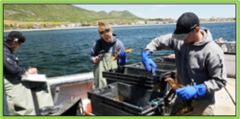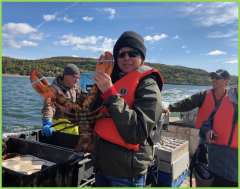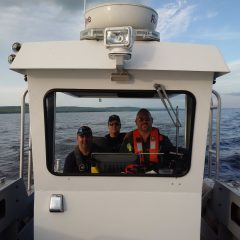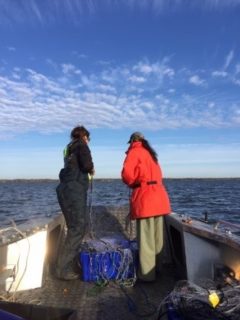Lawmaking for Nation Rebuilding
How First Nations are reclaiming their right to self-government by making their own laws
Ben Sylvestre
In addition to this article, RFNG is producing a range of in-depth case studies based on its Spring 2022 Lawmaking Workshop to be released over the coming weeks. To view all currently available entries in this series, please go to our publications page.
“We’re all very familiar with the Indian Act—each and every one of us—and now is the time to change,” said Chief Harvey McLeod. “Now is the time that we really need to open up a discussion.”
The Upper Nicola First Nation Chief addressed his community’s Elders and leaders as they sat together in a shared space on their traditional territory in British Columbia. A camera live streamed Chief H. McLeod’s call for action to guests from ten other First Nations and Tribal Councils from coast to coast, setting the stage for the Rebuilding First Nations Governance Project (RFNG)’s Spring 2022 Lawmaking Workshop.
The event had one key goal: to provide Upper Nicola’s leadership and attendees from other First Nations with insights on how to reclaim, create, and implement their own laws based on the recent experiences of other First Nations.
Chief H. McLeod and other speakers at the workshop discussed the inherent right of Indigenous nations to govern themselves as unique legal entities rather than operating under Canadian laws. It’s a right of all Indigenous nations recognised by Canada in section 35 of its constitution and supported by an evolving body of case law.
It’s RFNG’s mission to help First Nations in Canada exercise this right.
The research project was created with the support of a 2.5-million-dollar SSHRC grant in 2020. The national partnership of First Nation communities, Tribal Councils, academic researchers, and public sector practitioners supports First Nations that have made the decision to transition from Indian Act administration to their own self-governance with research and education opportunities.
RFNG works alongside the Centre for First Nations Governance: a non-profit organization that works directly with First Nations on-the-ground and assists them in their transition. When a First Nation partnered with the Centre needs research support, the Centre calls in RFNG. It’s the mechanism behind events like this one.
Satsan (Herb George), a senior associate with the Centre, RFNG’s co-director, and a Wet’suwet’en Hereditary Chief expressed his own message of encouragement at the start of the lawmaking workshop.
“We have the inherent right to self government. And we’ll hear at the end of the day, we’ve also achieved that recognition in law and in the constitution,” he said.
With introductions over, focus shifted to the workshop’s main event: a series of three presentations from leaders and experts at the forefront of Indigenous lawmaking.
In the first and second presentations, representatives from Listuguj Mi’gmaq First Nation and Nipissing First Nation respectively discussed their experiences with creating laws in a critical area—fishing and fisheries. In the third, law experts talked about the legal and constitutional space for Indigenous lawmaking in Canada.
Creation story, worldview, and language imbue Listuguj Mi’gmaq fishing laws
Each year, the Listuguj Mi’gmaq First Nation remembers a police raid on the community in 1981 when Quebec law enforcement attempted to unlawfully deny the community its right to fish for salmon on its own territory off the Gaspé Peninsula.
But the day of remembrance, called Migwite’tm, has evolved. Now, Listuguj also celebrates its progress in exercising its rights since the illegal and unjust raid.

In the mid 1990s, Listuguj’s leadership created its own contemporary fishing laws. The community still relies on Listuguj’s laws to regulate fishing and fisheries today— not Canadian law or provincial law. It’s just one example of how the community is exercising its right to govern itself.
In recent years, Listuguj expanded its laws to cover lobster fishing and established a lobster fishery on its territory.
“It’s a very, very interesting time. But it’s also very challenging intellectually because there is no book on this. We’re writing the book as we go,” said Dr. Fred Metallic, Listuguj’s Director of Natural Resources.
He and Listuguj’s Chief Darcy Gray were at the helm of the community’s efforts to regulate lobster. In the pair’s presentation, Dr. Metallic chronicled his nation’s relationship with lawmaking and fishing, beginning as far back as the Mi’gmaq creation story from which Listuguj’s first laws derive.
“Before we start talking about common law and civil law, we first need to understand the Indigenous laws, the knowledge systems, the protocols in a territory,” he said.
Dr. Metallic said the Listuguj community held this idea in mind when identifying four Mi’gmaq principles to inform the laws that govern the community’s lobster fishery:
Ango’tmuq: taking care of something in a careful manner
Apajignmuen: the idea of sharing and of giving back
Gepmite’tmnej: respect (for the lobster and the community)
Weltetmeg: the idea of “we agree in thought” (consensus-building)
“We realized that we just didn’t want a plan where it’s about the money and conserving resources,” Dr. Metallic said.
He explained it was also important for Listuguj’s leaders to honour the agency of its community, the use of its language, and the importance of its history. This mindset is an important part of Listuguj’s lawmaking. It inspired more than just its lobster regulations.

Back in the mid 1990s, Listuguj’s leadership knew the nation needed to enforce its fishing laws. But considering the community’s history of abuse by Canadian law enforcement, implementing a system similar to the police or coast guard would do more harm than good. Listuguj didn’t want to set its community up for more violence or injustice.
“We can create laws, but we also live laws,” said Dr. Metallic.
So Listuguj’s leaders at the time established a ranger system that, to this day, focuses on resolving issues at the community level rather than relying on Canada’s courts or police.
“Since 1995, with the ranger program established, nobody has been charged with a fishing violation,” said Dr. Metallic. “There’s been some offenses, but those offenses have been addressed internally. Nobody has gone to court for breaking the laws on fisheries or the Fishery Act.”
After years of governing its own fisheries, Metallic said Listuguj wanted Canada to officially recognize its right to self-governance.

In 2021, the nation successfully negotiated an agreement with the Department of Fisheries and Oceans (DFO) in which Canada recognises Listuguj’s laws and right to govern its own fishery. Canada also agreed to cooperate with Listuguj and respect its treaty right to fish for a moderate livelihood.
Negotiating the agreement required efforts to educate the DFO, Listuguj’s Chief Gray said, but the Department eventually reached a point where negotiating and signing the deal was possible.
“Since then, they’ve been holding it up as an example of the type of agreement that can be reached with communities and nations,” he said. “But it wasn’t without a lot of work.”
Nipissing First Nation reasserts its stewardship responsibilities
1,200 kilometres away from Listuguj in northeastern Ontario, Nipissing First Nation is working hard to advance its own right to self governance. The nation has built up a broad-reaching body of law in areas such as citizenship, cannabis sales, and elections. But like Listuguj, Nipissing’s creation of fishing and fishery laws was a pivotal step in its self-governance efforts.
The nation is situated next to Lake Nipissing, an 873 kilometres-squared body of water home to lake sturgeon, walleye, bass, and other freshwater fish.
Nipissing First Nation has historically relied on freshwater fishing as an important food source. But following colonization and the Indian Act, the resource was placed under an immense amount of stress, according to the workshop’s second presenter, Nipissing First Nation’s Chief Scott McLeod.

“Under this newly formed Canada, by the 1950s and 1960s, our home, Lake Nipissing, became a world class fishery to sport fisherman—to the elite crowds of the non-Indigenous world—to come and angle and enjoy recreational activities on our water while we were marginalized,” he said.
“But then, around the 1970s and 1980s, we started to assert our rights. We started to challenge these arbitrary rules that were put on us. We knew that we had signed a treaty, and we knew that these rights were not negotiated away,” he added.
And with these rights, Nipissing First Nation had a responsibility to care for its land, water, and fish, Chief S. McLeod underlined.
Though the community faced several challenges from the Ontario government and authorities, it eventually began to create and enact laws regulating fishing on its territory. The settlers’ fishery eventually closed, and the nation created its own.
After a court battle in 1990, the Ontario government recognised Nipissing’s right to fish on the lake. And in 2004, the nation passed its own fisheries law. But despite this progress, because the Indian Act placed Lake Nipissing off-reserve, the community had no means of enforcing its regulations.
As a result, some of Nipissing’s own community were overfishing the lake, said Chief S. McLeod. The Ontario Government had no authority to stop them after the court ruling, but neither did Nipissing’s leadership. It created a legal loophole.
But Chief S. McLeod added that he could understand why the overfishing was happening, destructive as it was.
“It’s easy to look on the outside and say, well, you know, those fishermen were bad people, because they didn’t follow the communal laws,” he said, “But when you look at the bigger picture, for over a century, we were marginalized and kept out of this fishery. And the only thing that our fishermen and our members knew how to do was to resist government and to fight for anything they could get.”
In 2014, Nipissing’s walleye population was on the verge of collapse, Chief S. McLeod added. The community needed to re-connect with its stewardship responsibilities.
That same year, Nipissing found a solution to the loophole and a path towards re-educating the community on its duty to care for the lake.
To address the jurisdictional dilemma, it began discussions with the Ontario Ministry of Natural Resources on a memorandum of understanding—a type of legal agreement between two groups.

And in 2016, Nipissing and the Ministry signed the memorandum in which Ontario officially recognized the nation’s fisheries laws and authority to enforce them on the lake.
With the agreement, Nipissing’s leadership was able to create a small group of workers to guide the community in following its fishing laws. Nipissing uses a justice circle—a traditional restorative justice model—for reconciling breaches of the law. Both allowed the community to focus on re-education and community stewardship.
Like Listuguj, Nipissing’s approach to community justice has been effective.
“We haven’t had to run that justice circle probably in four or five years. We’ve had pretty much very strong compliance,” said Chief S. McLeod.
After making strides to re-connect with its responsibilities to its fish and water, Nipissing is successfully working on restoring the fish populations that were placed under stress. Its leadership aims to protect the ecosystem and the Nipissing First Nation community’s right to access the resource.
“As a First Nation government, we have to protect those rights of access,” he said.
Indigenous law experts weigh in on the right to self-govern
Kent McNeil and Naiomi Metallic, the workshop’s legal experts, made one thing clear in their presentation: there is room for Indigenous law and self-government in Canada.
McNeil, a non-Indigenous person, is a distinguished legal scholar who has dedicated his long career to Indigenous law. He’s written several books on the subject and has been recognised as an honorary member of the Indigenous Bar Association.
McNeil said the major existing claims that the Canadian government holds legal control over Indigenous peoples and their territories simply don’t hold up to scrutiny. The right of Indigenous peoples to govern themselves has never legally been extinguished.
“If Indigenous peoples don’t have their own laws regarding fishing—and that would apply to other areas: family matters, culture, language—then the danger is that federal and provincial law will apply by default,” said McNeil. “So it’s very important for Indigenous peoples to move ahead and fill the space.”
Professor Naiomi Metallic agreed. She’s the Chancellor’s Chair in Aboriginal Law and Policy at Dalhousie University, where she teaches law.
Professor Metallic, who also hails from Listuguj, said that though Indigenous peoples must still fight for their right to self govern, barriers in the Canadian legal system are starting to lower. She agrees with McNeil: there is a space for Indigenous law in Canada.
“We’ve got to keep doing this work and keep moving even though Canadian law has still got some catching up to do,” she said.
She added legal scholars and judges are finally beginning to dismantle the doctrine of discovery—the racist claim that Canadian settlers “discovered” the land that Canada currently occupies. The doctrine falsely argues settlers found the land without any established nations on it, and unfortunately, it’s deeply rooted in Canada’s legal system.
As for the future of First Nations self-governance, Professor Metallic emphasised the importance of cross communication between different Nations striving to advance their rights.
“The government has thrived in the past in working with us in silos, right? They’re not going to tell one First Nation what they are negotiating with the other,” she said. “This is why I think it’s so important for all of us to communicate with each other so that we can learn from each other.”
“The more that communities are speaking to each other about this, the more that we can take a unified stance,” she added.
Upper Nicola First Nation’s vision for the future
Upper Nicola’s journey of resistance is hardly anything new. The nation’s efforts to resist colonialism began the moment Canadian settlers started to take control of its territory.
The community’s recent surge of progress in asserting its right to self governance came alongside its partnership with the Centre for First Nations Governance. The non-profit organization has been working with Upper Nicola for approximately four years, shortly after when the nation began to make laws around child and family services.
Carol Holmes, the head of Upper Nicola’s Kʷu Stəmtímaʔ (Grandmother’s Group), was at the forefront of the nation’s lawmaking mission then. She and the group are still working to expand its family services laws, which include children.
“One of the key goals that we have–our mission–is to assert and assume our Indigenous jurisdiction,” she said.
Following its efforts with child and family services, the Upper Nicola community decided to work towards exercising its right to self-governance more holistically.
While Chief H. Mcleod is the community’s chief under the Indian Act, Elder Scotty Holmes leads the community under its right to self governance. With the support of the community, including Chief H. Mcleod, Elder Holmes is looking towards a future where Upper Nicola can make agreements with the Canadian government.
He says his nation’s future relationship with Canada needs to be based not only on a clear understanding of Upper Nicola’s law itself, but the ideas behind it.
“When we come to arrangements with the government, they have to clearly understand the intent of that document,” he said. “The only reason we’re signing that document is because we’re allowing them to be part of the family.”
RFNG’s workshop is just another step on the community’s self-governance journey. Upper Nicola’s leadership said they appreciated the presentations, which gave them some good ideas to apply to the self-governing initiatives they currently have underway.
Colette Sunday, the community’s band administrator, voiced her enthusiasm about her community’s progress.
“It’s pretty exciting times over the past couple years that we’ve been working with Satsan and the Centre for First Nations Governance—learning about our inherent rights, learning about how we’ve been living under the Indian act and understanding that we need to move forward and move past the Indian Act,” she said.
For Upper Nicola’s Chief Harvey McLeod, moving forward and advancing his community’s inherent right to govern itself means reclaiming what was taken from the community by Canada. But the future is bright.
“It’s so difficult when the only thing that we really know and is ingrained in us is that stinking Indian Act. And we’re starting to shed it,” he said.
“I know that this is just the start, and it’s gonna be really exciting moving forward.”